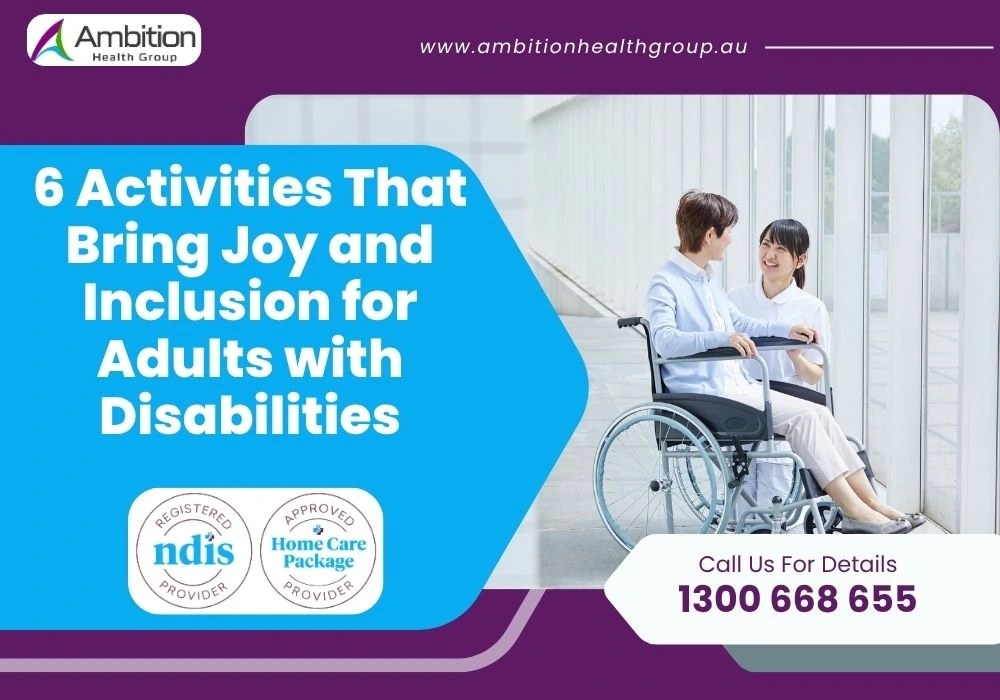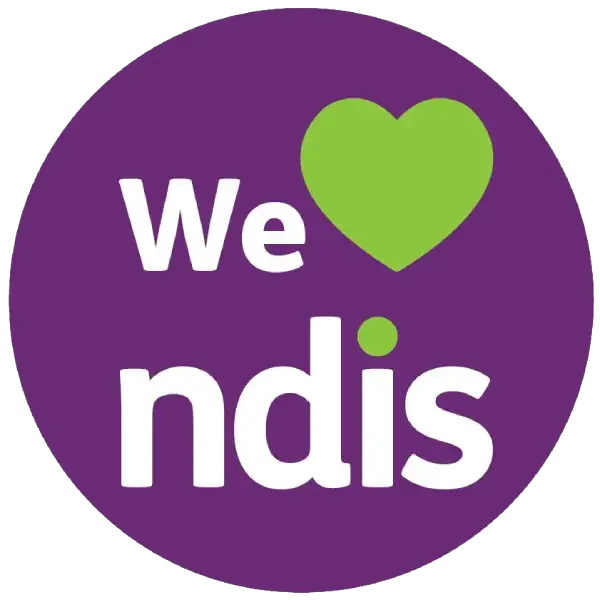Enquire about our SIL vacancies
When it comes to adults with disabilities, inclusion, and joy play a vital role in their mental, emotional, and social well-being. Too often, adults with disabilities are excluded from activities that can enhance their quality of life and provide meaningful social connections. However, there are plenty of activities that not only foster joy but also help these individuals feel connected, valued, and empowered. These activities promote a sense of belonging, provide opportunities for self-expression, and improve their overall health.
In this blog, we will explore six activities that bring joy and inclusion to adults with disabilities, offering them opportunities to engage, have fun, and be part of their communities.
1. Art and Creative Expression
Art is one of the most accessible and effective ways to foster inclusion and joy among adults with disabilities. Whether through painting, drawing, sculpting, or crafting, creative activities provide individuals with a channel for self-expression. These activities are not just about making beautiful objects; they offer a way for individuals to communicate their emotions, thoughts, and stories.Why Art Works for Inclusion and Joy:
- Fosters self-expression: Many adults with disabilities struggle with verbal communication, and art offers them an alternative means of expression. Creating art allows them to convey emotions and ideas that they might find hard to express with words.
- Encourages relaxation: The process of creating art, especially painting and sculpting, can be calming and therapeutic. Art has been shown to lower stress levels and promote emotional healing.
- Improves fine motor skills: Many artistic activities help improve fine motor skills, including hand-eye coordination, dexterity, and spatial awareness. Whether it’s holding a paintbrush, molding clay, or cutting paper for collages, art encourages physical engagement in a creative way.
- Promotes social interaction: Group art classes or community workshops provide an opportunity for socializing and building relationships with others. This fosters a sense of community, where individuals with disabilities can share experiences and bond over common interests.
2. Adaptive Sports and Physical Activities
Exercise is a key element of maintaining physical and mental health, and adaptive sports are an excellent way for adults with disabilities to engage in physical activity. Adaptive sports are specifically designed or modified to ensure that individuals with different abilities can participate. Activities such as wheelchair basketball, adaptive swimming, and seated volleyball are just a few examples of sports that have been adapted to meet the needs of individuals with physical or developmental disabilities.Why Adaptive Sports Work for Inclusion and Joy:
- Physical health benefits: Regular physical activity improves cardiovascular health, strength, flexibility, and overall well-being. Adaptive sports help individuals maintain a healthy lifestyle while enjoying themselves.
- Improves coordination and motor skills: Participation in adaptive sports enhances motor skills, coordination, balance, and flexibility, which are essential for overall mobility and independence.
- Sense of achievement: Participating in sports, whether winning a match or simply improving personal fitness, offers individuals a sense of accomplishment and boosts self-esteem. The challenge of mastering a new skill or achieving a personal goal is highly rewarding.
- Fosters teamwork and camaraderie: Team sports, in particular, help individuals with disabilities feel like part of a community. The teamwork, shared experience, and collaboration involved in team sports promote social bonding and communication.
3. Music and Dance
Music and dance are powerful forms of self-expression that bring people together in a joyful and inclusive way. These activities can lift spirits, boost emotional health, and bring a sense of unity. Adults with disabilities can enjoy music and dance through various forms, including singing, playing instruments, rhythm exercises, and dance classes tailored to different abilities.Why Music and Dance Work for Inclusion and Joy:
- Emotional release: Music is known for its therapeutic effects. Listening to music or engaging in rhythmic movement (such as dancing) allows adults with disabilities to release emotions, reduce anxiety, and improve mood.
- Stimulates cognitive function: Music and dance involve listening, memory, and movement, all of which stimulate brain activity and improve cognitive skills. For example, learning to play an instrument or following dance routines can increase focus, memory, and concentration.
- Promotes physical activity: Dance, in particular, is an enjoyable way to engage in physical activity. It helps improve mobility, flexibility, and balance, all while offering a fun, social experience.
- Creates social bonds: Music and dance activities often take place in group settings, offering adults with disabilities opportunities to interact with others, make friends, and experience a sense of belonging.
4. Volunteering and Community Service
Volunteering is a wonderful way for adults with disabilities to feel included in their community and make a positive impact. Giving back through volunteer work helps build self-worth, encourages social interaction, and provides a sense of purpose. Adults with disabilities can participate in a variety of volunteer activities, such as helping at food banks, assisting at animal shelters, or supporting environmental efforts.Why Volunteering Works for Inclusion and Joy:
- Sense of purpose: Volunteering offers adults with disabilities an opportunity to contribute to their community in meaningful ways. This fosters a sense of pride and purpose that boosts emotional well-being.
- Promotes social inclusion: Volunteering often brings together people from different backgrounds and abilities, fostering social inclusion. It creates opportunities for people with disabilities to interact with others and build relationships.
- Develops skills: Volunteering provides valuable learning experiences and opportunities to develop new skills. Whether it’s organizing events, managing projects, or helping others, volunteering can boost self-confidence and provide work experience.
- Reduces isolation: By connecting with others and working as a team, adults with disabilities can combat feelings of loneliness and isolation, helping them feel more engaged with the world around them.
5. Gardening and Horticultural Therapy
Gardening is a therapeutic activity that provides numerous physical, emotional, and social benefits. Gardening is often used as a form of horticultural therapy, which involves using plants and gardening activities to promote healing, improve mental health, and enhance overall well-being. Gardening offers a peaceful environment where adults with disabilities can connect with nature and find joy in nurturing plants.Why Gardening Works for Inclusion and Joy:
- Sensory engagement: Gardening stimulates all five senses—sight, touch, smell, taste, and hearing—which can be deeply enriching, especially for individuals with sensory impairments.
- Physical benefits: Gardening can improve fine motor skills, strength, and mobility. Tasks such as planting, weeding, and watering help with coordination and dexterity.
- Emotional well-being: Spending time in nature and caring for plants has been shown to reduce stress, anxiety, and depression. The act of nurturing a plant and watching it grow provides a sense of accomplishment and satisfaction.
- Social connections: Community gardening projects allow adults with disabilities to meet others and collaborate on gardening projects, fostering social interactions and a sense of belonging.
6. Social Clubs and Peer Support Groups
Joining a social club or peer support group is a fantastic way for adults with disabilities to meet like-minded people, share experiences, and feel included in their communities. Whether it’s a book club, an art group, a cooking class, or a gaming group, these clubs provide a space for individuals to engage in shared activities, build friendships, and find emotional support.Why Social Clubs and Peer Support Groups Work for Inclusion and Joy:
- Fosters a sense of belonging: Being part of a group with shared interests or experiences creates a feeling of community and inclusion, which is vital for emotional well-being.
- Empowerment through shared experiences: Peer support groups provide a platform for individuals to talk about challenges, share advice, and support one another. This mutual support can reduce feelings of isolation and promote personal growth.
- Encourages regular engagement: Social clubs and groups offer regular activities and meetings, helping adults with disabilities stay socially active and engaged in their community.
- Boosts self-esteem: Participation in social clubs helps build self-confidence and encourages a sense of achievement. Feeling valued and accepted within a group helps individuals improve their overall self-image.
Conclusion
Joy and inclusion are not just desirable—they are essential for the well-being of all individuals, especially adults with disabilities. By encouraging participation in activities such as art, adaptive sports, music, volunteering, gardening, and social clubs, we can create a world where everyone feels empowered, valued, and connected. These activities provide not only physical and mental health benefits but also foster a sense of community and belonging, combating isolation and promoting personal growth. Whether through self-expression, physical engagement, or building meaningful connections with others, there are countless opportunities for adults with disabilities to experience joy and inclusion. At Ambition Health Group, we believe in the power of inclusion and holistic well-being. Our mission is to create opportunities for individuals to live enriched, fulfilling lives, and we are dedicated to supporting adults with disabilities in finding joy, purpose, and community. Together, we can build a society where everyone, regardless of ability, has the chance to participate, connect, and thrive.Recent Posts
Top Rated Services
Get A Quick Quote Now
Enquire about our SDA vacancies
Enquiry Now
Consult Our Care Experts
Grab Your Free Consultation Today!
Or give us a call to speak to someone now
1300 668 655









